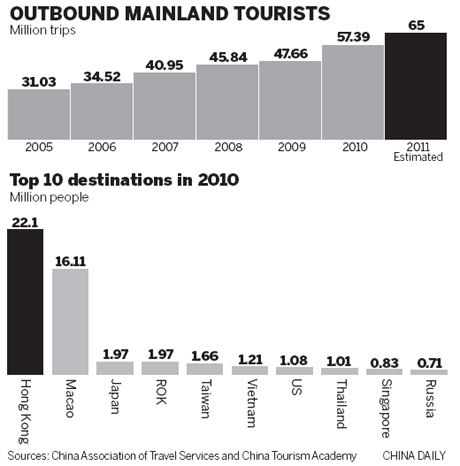Economy
Mainland tourists big spenders overseas
By Xin Dingding (China Daily)
Updated: 2011-04-13 13:07
 |
Large Medium Small |
A Chinese tourist takes a photo with a whale in the background at an ocean park in San Diego, California, in October 2010. [Photo / China News Service]

Travelers spend more on shopping than food, hotels, other expenses
BEIJING - More mainland tourists are expected to spend money on overseas travel this year, according to a report released to the national tourism authority on Tuesday.
The Annual Report of China Outbound Tourism Development 2011, released by the China Tourism Academy, estimates that mainland tourists will make 65 million trips to foreign countries as well as Hong Kong, Macao and Taiwan this year, up from 57.39 million in 2010.
They are expected to spend $55 billion overseas, up from $48 billion a year earlier, the report said.
| ||||
"The main reason for this (ranking) is that mainland tourists prefer to shop during their trips," he said.
The academy surveyed more than 2,000 tourists in six big cities last year, and found 26.85 percent of the respondents said they spend more money on shopping than on food, hotel rooms or other expenses.
The survey also showed that 76 percent of the money mainland tourists spent in Hong Kong in 2010 went to shopping. For those who visited Macao, the number for shopping expenditures was 63 percent and it was 50 percent for those who went to Taiwan.
Hong Kong and Macao are the two overseas destinations most popular among mainland tour groups. Japan and South Korea occupied the two next highest places in the ranking.
In one change in the list, Taiwan overtook Vietnam this past year and became the fifth most popular destination for mainland tourists, receiving 1.66 million of them. The number is expected to continue rising, largely because tourism authorities across the Straits plan to let individual tourists from Beijing and Shanghai visit Taiwan without joining tour groups. The change could come as soon as July, insiders say.
The US attracted 1.08 million mainland tourists last year, making it the seventh most popular destination on the list. Russia, meanwhile, managed to occupy the No 10 spot in the ranking by attracting 710,900 mainland tourists in 2010. It and the US are the only two destinations among the top 10 that are not Asian countries.
But despite researchers' optimism for the tourism industry this year, industry insiders see things differently.
Zhong Hui, general manager of Beijing-based China Environment International Travel Service Co Ltd, said 2011 "began with bad luck", alluding to the unrest in North Africa and the Middle East, flooding in Australia and the earthquake and tsunami that hit Japan, which is still contending with a nuclear emergency.
"My company has suffered big losses, after tour groups to Egypt, Australia and Japan were canceled," he said.
Xu Daoming, general manager of the marketing department of China Travel Service, said: "There will be no tour groups heading to Japan before June or even later."
Fei Fei, from Chongqing municipality, said the company she works for has canceled a plan to take employees to tour Japan this year in response to fears about the ongoing nuclear emergency. She was instead offered a trip to Taiwan island, South Korea or Thailand's Phuket island. Settling on one will be "a difficult choice to make".
Dai Bin, head of the tourism academy, said it may take travelers some time to overcome their radiation fears enough to visit Japan.
But Dai believed that despite the recent disasters, the number of mainland tourists going to places outside the mainland will continue to increase.
The latest official figures show that 16 million mainland tourists visited overseas destinations in the first quarter of this year, up 16 percent from the same period last year.
With 100 million people expected to travel overseas by 2020, China now contains the largest native population of tourists in Asia.

| 分享按钮 |



